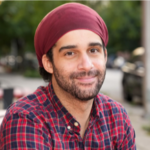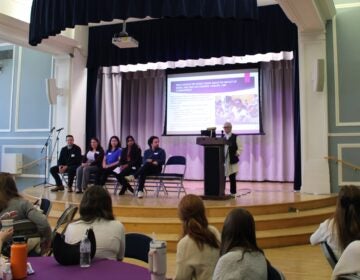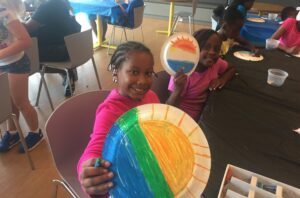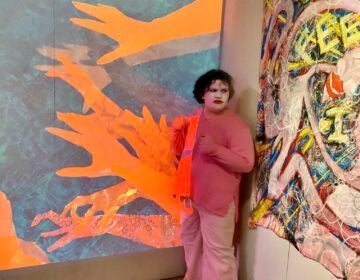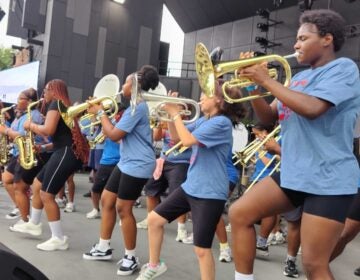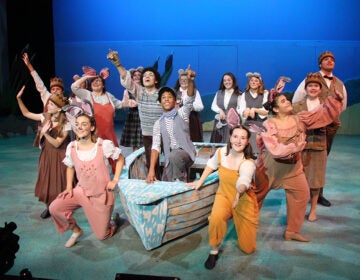At a Bryn Mawr theater program, actors with disabilities tell their stories ‘without boundaries’
Parents of participants say afterschool program has helped their children connect to others like them and feel empowered in a creative atmosphere.

Students with Acting Without Boundaries celebrate their live production of "The Fisherman and the Fluke." (courtesy of Sarah Breck)
From Philly and the Pa. suburbs to South Jersey and Delaware, what would you like WHYY News to cover? Let us know!
Outside The Haverford School, 7-year-old Flynn Dorney is excited to show you what he and his friends are working on.
Flynn has been enjoying his first year with Acting Without Boundaries, a Bryn Mawr-based acting program where students and adults from around the region can put on plays they wrote and produced themselves. He’s taken a liking to acting on stage and being in the sound booth to help with its production.
But for Flynn, who has cerebral palsy and a visual impairment, it’s far more than just helping put on a production of “The Fisherman and The Fluke.”
The afterschool program has become a supportive community that has helped him and others gain more confidence in their personal lives and in the classroom.
“I just loved how fun and inclusive and how kind everyone is,” Flynn said. “It makes me feel like I’m not alone.”
His mother, Meredith Dorney, called the program “life-changing” for both of them.
She said Flynn had struggled to feel accepted in formal classroom settings, which deeply affected his emotional well-being. They had searched for a more welcoming environment, and the program became that refuge.
“It’s what I’ve been missing as a parent,” Dorney said, adding that it’s also given him more confidence in those social settings where he previously felt like an outsider.
“Even though he doesn’t go to school with these children, it translates,” she said.
A Foundation of Inclusion and Growth
Acting Without Boundaries was founded in 2004 and began as a small initiative inspired by a similar summer program in Maine, according to Maria Ceferatti, the artistic director of Acting Without Boundaries Jr. and music director of Acting Without Boundaries Sr.
Ceferatti joined the program a year later, after she was recruited by founder Christine Rouse, who believed her music education background was a great fit for the program — especially since Ceferatti’s son, Simon Bonenfant, who is blind also joined and remains part of the productions two decades later.
Today, Ceferatti leads Acting Without Boundaries Jr., which serves school-aged children with physical disabilities.
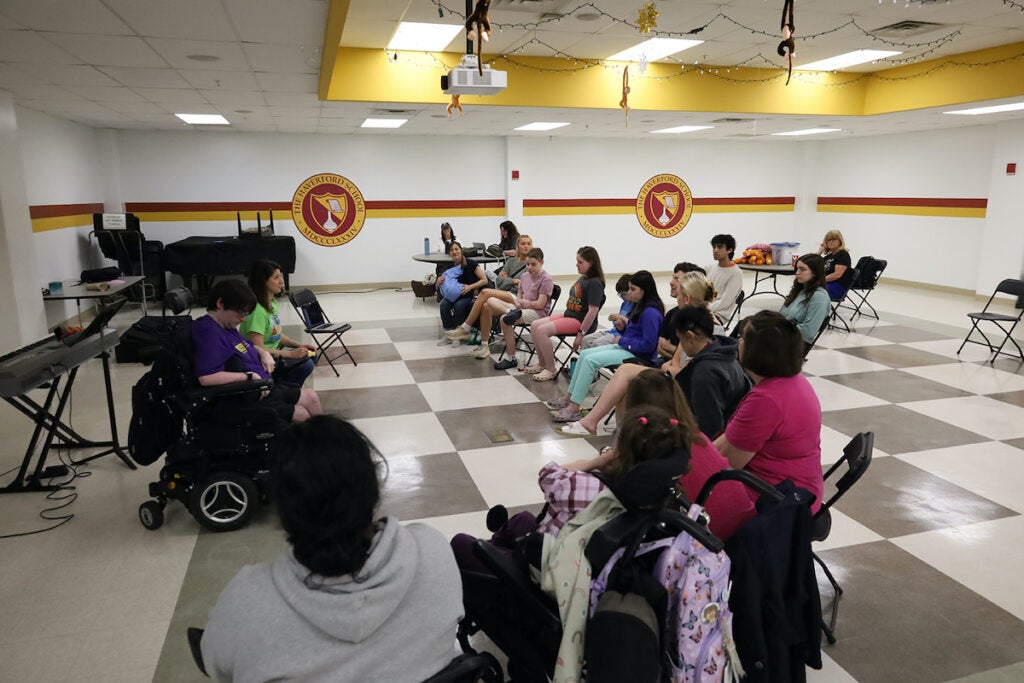
“I kept going because I could see their love,” Ceferatti said about the children and their parents. “This community of parents is fantastic and it’s like a family.”
Enrolling in drama production in school can also help students in other areas of their education. A sampling of SAT scores from 2001, 2002, 2004 and 2005 from the College Entrance Examination Board found that students involved in drama production “outscored the national average SAT score by 35 points on the verbal portion and 24 points on the math section,” according to the American Alliance for Theatre & Education.
In addition, the group said that participating in dramatic productions “can help to build the self-esteem and communication skills of high school students.”
For Flynn, it didn’t take until his teenage years to see that benefit.
Growing Through Performance
For Addison Evans, a 14-year-old Pennfield Middle School student born with congenital myotonic muscular dystrophy, the program has improved her reading comprehension in ways her parents never imagined.
Her father, Craig Evans, recalled that when Addison was 9, she was still reading books intended for much younger children. That began to change after his company sponsored an Acting Without Boundaries event about five years ago. He decided to enroll his daughter in the program shortly afterwards and has seen immediate results.
“Every time we go to her [Individualized Education Program] meeting … her teachers are very impressed with the way she’s been progressing,” Evans said. “I don’t know that I expected any of this.”
“All that she’s overcome … some of her doctors early on thought she would never develop like this,” he added.
Addison herself said she enjoys her time on stage and the fact that it’s a collaborative experience where not only does she and others contribute potential changes to the script, but they are also quick to aid each other if they stumble over a line.
“I usually say my lines clear and correctly on stage. If I get stuck on one, I usually get someone to help me,” Addison said.
Her mother, Lauren Evans, said it was also important to them to enroll her in afterschool programs to help her feel like she’s any other child. She’s also enrolled in karate and soccer outside of the acting program.
“We treat her like she’s any other kid,” she said. “We want you to have activities out of school.”
There are aspects of that level of respect throughout the program, especially as it transitions into the senior-level program, which includes older teenagers and adults in the production.
Raising the Bar: High Expectations on Stage
As Neill Hartley, the artistic director of the program, leads rehearsal inside the school, there’s still an expectation that participants memorize their lines and be receptive to stage direction, even if there’s more encouragement and assistance than you’d see in other rehearsals.
“I place the same requirements that I would on any other performer,” he said. “It’s kind of allowing humanity to be what it is as opposed to what it should be.”
Watching the rehearsal only reaffirms this as Hartley directs participants in wheelchairs to their simulated spots on stage and makes actors re-read their lines if there are any stumbles, albeit with a bit more encouragement than you might see on a Hollywood movie set.
He said that while being in the program for two decades has taught him to have patience, his formal background in acting also pushes him to want to get the best out of his performers.
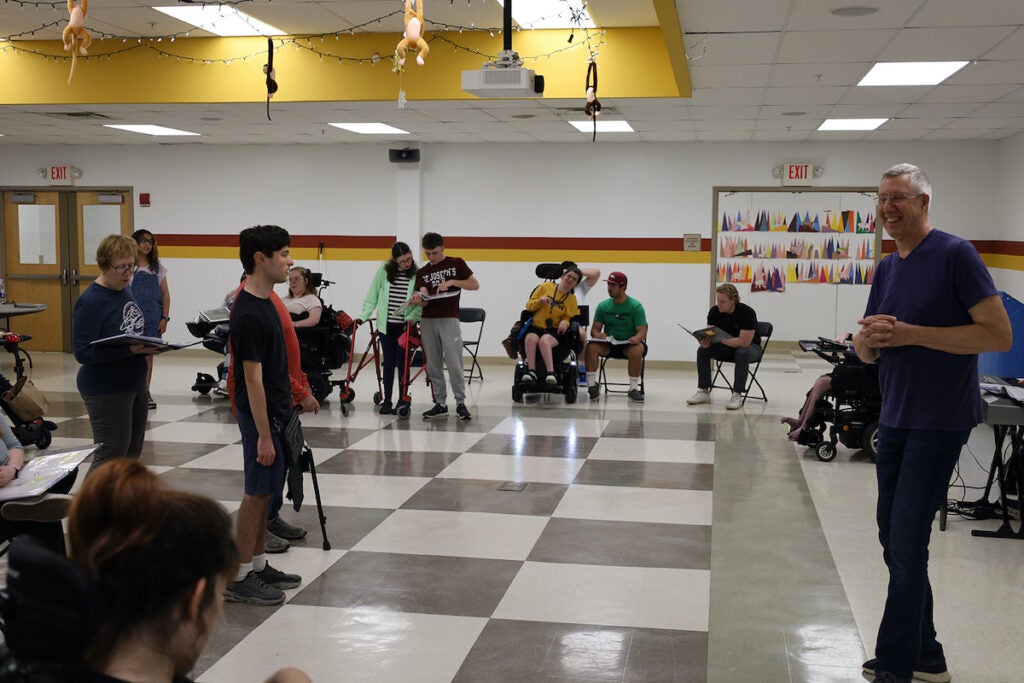
“If it takes a while to get there, it takes a while to get there,” he added.
Hartley joined when the program first started as a volunteer before he was elevated to be its artistic director.
He said he has a brother with “special needs” and remembers the struggle his mother went through trying to get him accommodated in a school system that had limited options at the time.
According to the National Center for Education Statistics, 7.5 million students aged 3 to 21 years old “received special education and/or related services under the Individuals with Disabilities Act” during the 2022-23 school year. That’s roughly 15% of all public school students.
In Pennsylvania, 21% of all public school students received some special education-related services, according to the center.
However, schools have continued to struggle to hire special education teachers in recent years. A study released last year by the National Center for Education Statistics’ School Pulse Panel that surveyed nearly 1,400 public schools found that 74% of elementary and middle schools reported having trouble hiring special education teachers, along with 66% of high schools.
Hartley said not having programs that cater to their needs can contribute to “the sense of isolation that exists” among people living with disabilities.
As Ceferatti plays the keyboard while performers practice their singing roles, others can be seen talking with one another and laughing as they connect with someone in a similar situation.
For 7-year-old Benjamin Fagioli, who was diagnosed with cortical visual impairment, a disorder caused by damage to the parts of the brain that process vision, the atmosphere has helped him come out of his shell.
His mother, Jacquelyn Fagioli, said that while he can still be somewhat shy and doesn’t participate as much in the rehearsals, he’s found joy in helping with the production and excels in the spotlight when the curtains are drawn on stage.
“He loves the cheering and the claps,” she said.
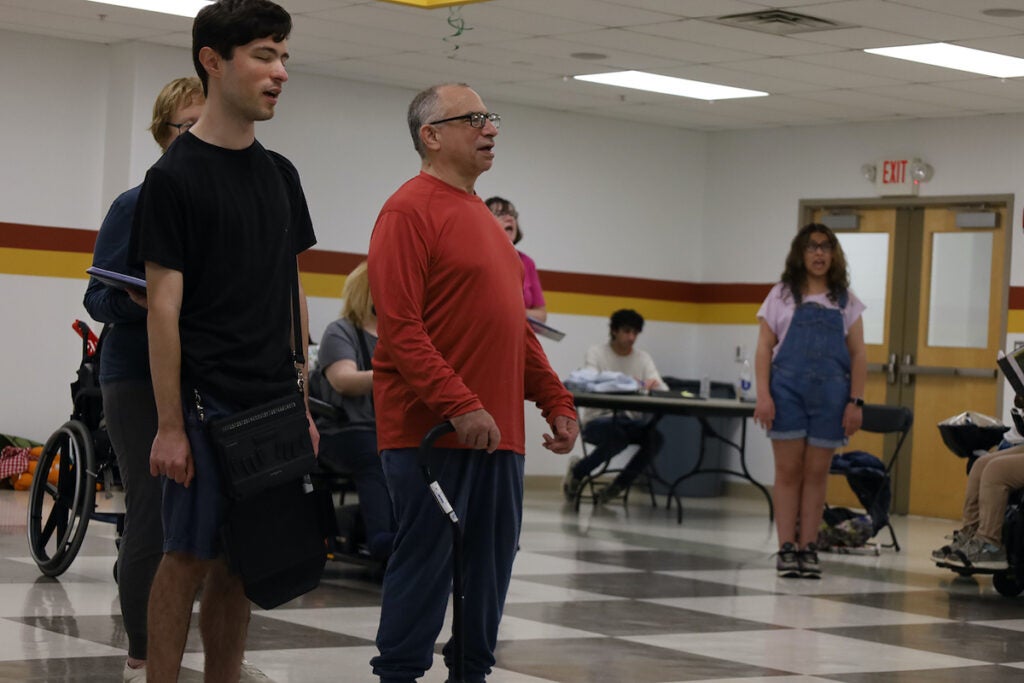
The 7-year-old will regularly set up a show for his stuffed animals at home to simulate the stage atmosphere, she added.
And for her, it’s been the outlet they’ve both needed as he goes to the St. Lucy School for Children with Visual Impairments.
“It brings happy tears to my face,” she said.
It’s evident that for her and many others in attendance during Saturday’s rehearsal that the program is as much about being a creative outlet as it is a place to feel comfortable in their own skin.
Editor’s Note: This story is part of a series that explores the impact of creativity on student learning and success. WHYY and this series are supported by the Marrazzo Family Foundation, a foundation focused on fostering creativity in Philadelphia youth, which is led by Ellie and Jeffrey Marrazzo. WHYY News produces independent, fact-based news content for audiences in Greater Philadelphia, Delaware and South Jersey.
This article was updated to reflect that Maria Ceferatti’s correct title is artist director and music director.

Get daily updates from WHYY News!
WHYY is your source for fact-based, in-depth journalism and information. As a nonprofit organization, we rely on financial support from readers like you. Please give today.


